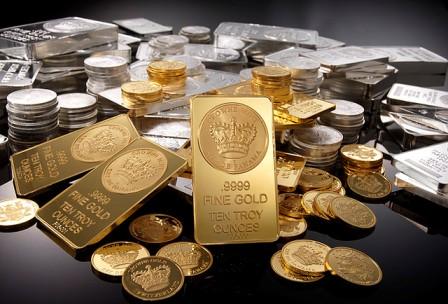
Gold bullion market traded above $1730 an ounce Friday morning in London, having earlier touched a two-week high, while stocks fell and the Dollar and US Treasury bonds gained, with analysts suggesting weak growth and monetary policy are likely to persist.
Silver bullion traded close to $32.30 an ounce for most of this morning, 4.3% up on the week, while oil and copper prices ticked lower.
“Precious metals continue to push higher, with the rest of the complex being led by gold,” says Marc Ground, commodities strategist at Standard Bank. “In spite of Dollar strength, the market appears to continue to take comfort from Obama’s re-election and the implied support this gives to continued monetary accommodation from the Fed.”
Heading into the weekend, gold bullion looks set to record its first weekly gain since the start of October, having risen more than 3% since the start of the week.
Gold traders are at their most bullish since August 24, according to newswire Bloomberg, which reports that 25 of 33 analysts polled say they expect gold bullion to rise next week. Friday August 24 saw the first of five consecutive weekly gains for spot gold.
“Renewed inflows into gold ETFs are responsible for the increase in price,” says a note from Commerzbank, “having totaled 10.5 tonnes in the past three days alone.”
Gold’s 1.7% jump on Tuesday could have been caused by a gold purchase made by the Soros Fund, Standard Bank’s Yuichi Ikemizu writes in his daily ‘Bruce Report’ today, citing a rumor circulating among New York traders.
“Markets continue to trade on a weak note given lingering [US] fiscal cliff concerns and worries about whether Greece will get the funding it needs to meet debt payments” says Nick Verdi, Singapore-based currency strategist at Barclays.
ECB president Mario Draghi told a press conference Thursday the European Central Bank is “by and large, done” with assisting Greece.
“On Greece, we certainly cannot do monetary financing,” Draghi said, though he added that the ECB did agree a part of Greek debt restructuring back in February that it will forego profits on holdings of Greek debt bought under its Securities Markets Programme.
“What happens is that these profits naturally accrue to the central banks that are members of the Eurosystem…[who may then] transfer these profits to the governments and then it is up to the governments to decide whether they want to re-use these profits for Greece. And the governments actually committed themselves to do so at that time.”
Draghi also answered a series of questions on whether he would like to see Spain request a bailout by saying it is up to the Spanish government and not the ECB. The ECB’s sovereign bond buying program, Outright Monetary Transactions, requires a government to have agreed to an adjustment program before the ECB will buy its bonds in the secondary market.
Benchmark yields on 10-Year Spanish government bonds touch a one-month high this morning, a day after Spain auctioned longer-term bonds for the first time in 18 months, according to newswire Reuters.
“The five-year sale was awful,” said one trader, citing a wide discrepancy between the highest yield accepted for the bond and the average yield. Spain has over €100 billion of debt due to mature next year.
The ECB voted to leave its key interest rate on hold at 0.75% Thursday.
“We have penciled in an interest-rate cut in December,” says Howard Archer, economist at research firm IHS Global Insight.
The Euro fell to a one-month low against the Dollar Friday, while Euro gold prices traded within 2% of last month’s all-time high.
Elsewhere in Europe, German inflation held steady at 2% last month, according to figures published this morning.
Over in China, industrial production grew by 9.6% in the year to October, official figures published Friday show, up on the previous month and a stronger acceleration that most analysts forecast.
Retails sales growth was also stronger-than-expect last month at 14.5% year-on-year – up from 14.2% in September.
“The domestic economy is evolving in a good direction,” China’s central bank governor Zhou Xiaochuan said Thursday, ahead of the release of the above data.
“The key question for investors,” says Bank of America Merrill Lynch economist Lu Ting, “is whether China’s economic growth has truly bottomed out. Based on October data… the answer is firmly yes.”
China’s consumer price index meantime shows inflation fell to 1.7% last month, down from 1.9% a month earlier.
“The October CPI confirms that inflation is currently not a main concern for the government,” says Nomura analyst Zhang Zhiwei. “Policy easing will likely continue in Q4 to support a growth recovery.”
Chinese gold bullion demand is expected to hit 860 tonnes this year, a 1% increase on 2011, according to Philip Klapwijk, global head of metals analytics at consultancy Thomson Reuters GFMS.
“China will overtake India [this year],” Klapwijk told the online Reuters Global Gold Forum Thursday, “both in overall demand terms and as the world’s largest jewelry market.”



 Follow us on Twitter
Follow us on Twitter Become our facebook fan
Become our facebook fan










Comments are closed.